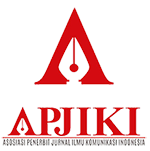Representasi Karakter Alpha Female Dalam Drama Korea Queenmaker
Abstract
Korean dramas or (Drakor) have become a global phenomenon, gaining widespread popularity around the world. They are recognized not only as entertainment but also as complex reflections of social dynamics. The presence of Alpha Female characters in Drakor signifies support for gender equality and indicates societal shifts in views on women's roles in various aspects of life. This study aims to understand the representation of Alpha Female characters in the Korean drama Queenmaker hoping to gain new insights into societal perceptions of women beyond the domestic sphere. Using a qualitative approach and Charles Sanders Peirce's semiotic analysis, the research found that Alpha Female characters exhibit leadership, confidence, and strength in facing challenges. From Peirce's perspective, these characters become important symbols that reinforce women's roles in fighting injustice and advocating for moral values. The findings underscore that Drakor is not just entertainment, but also a mirror of social realities that significantly influence perceptions of gender equality, expanding our understanding of women's roles in popular culture and the importance of gender equality in society.
Keywords
Full Text:
PDFReferences
Bell, E., Meriläinen, S., Taylor, S., & Tienari, J. (2019). Time’s up! Feminist theory and activism meets organization studies. Human Relations, 72(1), 4–22. https://doi.org/10.1177/0018726718790067
Bello, Y. F. M. (2024). ALPHA FEMALE DALAM NOVEL THE ALPHA GIRL’S GUIDE. Lentera: Multidisciplinary Studies, 303(308), 2–2.
Cristy, A. P., Danadharta, I., & Ayodya, B. P. (2023). Representasi Karakter Alpha female Pada Drama Korea (Analisis Semiotika Pada Film The World Of The Married). Universitas 17 Agustus 1945 Surabaya, 1(2).
Dian, R. (2023, June 27). Perbedaan Kepribadian Alpha hingga Sigma Female yang Harus Kamu Ketahui. Narasi.
Ermawati, S. (2016). Konflik Peran Ganda Wanita Karier ditinjau dalam Prespektif Islam. Jurnal Edutama, 59–69.
Fella, S., & Sair, A. (2020). “MENJADI KOREA”: MELIHAT CARA, BENTUK DAN MAKNA BUDAYA POP KAREA BAGI REMAJA DI SURABAYA. Urban Sosiology, 3(2), 7–19.
Hafidha, I. S. (2021, April 7). Pengertian Drama Menurut Para Ahli, Ketahui Ciri-ciri dan Unsurnya. Liputan6.
Hasanah, R. R., & Ratnaningtyas, R. P. (2022). Representasi Maskulinitas Perempuan dalam Drama Korea My Name. 4(1).
Iivari, N., Tervo, E., Käsmä, M., & Heikkinen, M. (2023). Participatory design meets gender equality at European higher education institutions. CoDesign, 19(4), 304–326. https://doi.org/10.1080/15710882.2023.2215742
Irotha, S., & B. Suparno, D. (2023). THE EXISTENCE OF WOMEN IN KOREAN DRAMA GENRE FILMS WITH A SEMIOTIC APPROACH BY CHARLES SANDERS PIERCE. UIN Syarif Hidayahtullah Jakarta, 22(05), 1650–1666.
Kriyanto, R. (2014). Teknik Praktis Riset Komunikasi (Edisi Ketujuh). Kencana Pemanda media Group.
Larasati, A. A. (2024, March 8). Mengenal Istilah Alpha Woman, Perempuan Juga Bisa Menjadi Pemimpin. JURNALPOS MEDIA.
Maharani, R., & Wiksana, W. A. (2022). Representasi Alpha Female Dalam Drama Korea. Bandung Conference Series: Communication Management, 2(2), 727–733.
Mayangsari, M. D., A. D. , P., & P. S., K. F. , & M. U. L. (2018). Keseimbangan kerja-kehidupan pada wanita karir. . Jurnal Ecospy, 43–50.
Muhammad, H. (2017). Alpha Female Representation as Ideal Women in Henry Manampiring’s The Alpha Girls Guide. Interaksi Online - E-Journal UNDIP, 5(3).
Nawawi, M. I., Anisa, N., Syah, N. M., Risqul, M., Azisah, A., & Hidayat, T. (2021). Pengaruh Tayangan K-Drama (Korean Drama) terhadap Motivasi Belajar. EDUKATIF : JURNAL ILMU PENDIDIKAN, 3(6), 4439–4447. https://doi.org/10.31004/edukatif.v3i6.1201
Pervaiz, Z., Akram, S., Ahmad Jan, S., & Chaudhary, A. R. (2023). Is gender equality conducive to economic growth of developing countries? Cogent Social Sciences, 9(2). https://doi.org/10.1080/23311886.2023.2243713
Prasanti, P. R., & Dewi, N. I. A. (2020). Dampak Drama Korea (Korean Wave) Terhadap Pendidikan Remaja. Jurnal Pendidikan , 11(2), 256–269.
Rahmayanti, V., & Karyono, O. (2024). REPRESENTASI ALPHA WOMAN: PERAN WANITA KARIR DALAM MENINGKATKAN EKONOMI KELUARGA. Jurnal PenKoMi: Kajian Pendidikan & Ekonomi, 7(1), 108–104.
Romadhon, N. F. (2018). HALLYU: TREN BUDAYA POPULER DRAMA KOREA. Journal Ilmu Pemerintahan Dan Politik , 4(1), 1–19.
Rosyidah, A., & Suyadi, S. (2021). MASKULINITAS DAN FEMINITAS KEPEMIMPINAN PENDIDIKAN ISLAM: KAJIAN DEFERENSIASI OTAK LAKI-LAKI DAN PEREMPUAN PERSPEKTIF NEUROSAINS. Evaluasi: Jurnal Manajemen Pendidikan Islam, 5(1), 49–70. https://doi.org/10.32478/evaluasi.v5i1.545
Sugiono. (2016). Memahami Penelitian Kualitatif (Cet 12). Bandung : Alfabeta.
Sumra, M. K. (2019). Masculinity, femininity, and leadership: Taking a closer look at the alpha female. PLOS ONE, 14(4), e0215181. https://doi.org/10.1371/journal.pone.0215181
Topan, A. D., & Ernungtyas, F. N. (2020). PREFERENSI MENONTON DRAMA KOREA PADA REMAJA. JURNAL PUSTAKA KOMUNIKASI , 3(1), 37–48.
Vaughan, R. P., & Longlands, H. (2023). A technology of global governance or the path to gender equality? Reflections on the role of indicators and targets for girls’ education. Comparative Education, 59(2), 282–304. https://doi.org/10.1080/03050068.2022.2145774
Winoto, Y., & Rachmawati, T. S. (2017). THE MEANING OF ALPHA FEMALE IN FEMALE LIBRARIAN: Building a Positive Image of Libraries through Female Librarians as Alpha Female. Humanus, 16(1), 50. https://doi.org/10.24036/humanus.v16i1.7344
Wiraputri, J. E., & Listijabudi, D. K. (2022). LIDIA SANG ALPHA FEMALE? Pembacaan Tokoh Lidia dalam Kisah Para Rasul 16 Melalui Alpha Female Inventory . Universitas Kristen Duta Wacana, Yogyakarta, 2(2).
Zagoto, M. M., Yarni, N., & Dakhi, O. (2019). PERBEDAAN INDIVIDU DARI GAYA BELAJARNYA SERTA IMPLIKASINYA DALAM PEMBELAJARAN. Jurnal Review Pendidikan Dan Pengajaran, 2(2), 259–265. https://doi.org/10.31004/jrpp.v2i2.481
DOI: https://doi.org/10.32509/pustakom.v7i2.3968
Refbacks
- There are currently no refbacks.
Copyright (c) 2024 Jurnal Pustaka Komunikasi

This work is licensed under a Creative Commons Attribution-NonCommercial-ShareAlike 4.0 International License.
Indexed by:
Recommended Tools :
Jurnal Pustaka Komunikasi
Fakultas Ilmu Komunikasi, Universitas Prof. Dr. Moestopo (Beragama)
Kampus I, Jl. Hang Lekir I/8 Jakarta Pusat, Indonesia 10270
WA: 085714422271 (Chat Only)
email: pustakom@dsn.moestopo.ac.id
Copyright (c) 2025 Jurnal Pustaka Komunikasi
Licensed under a Creative Commons Attribution-ShareAlike 4.0 International License.














